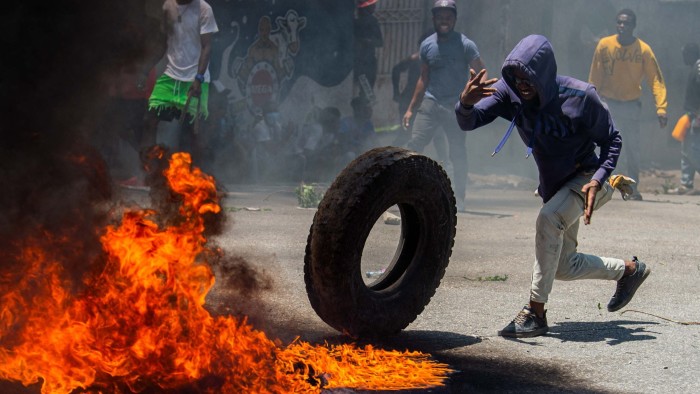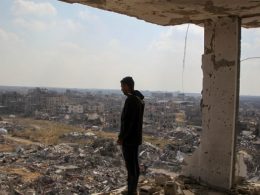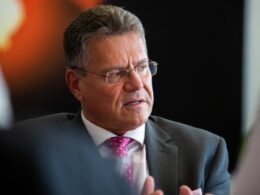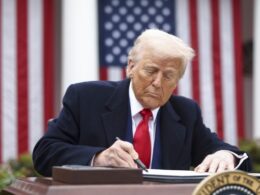Unlock the White House Watch newsletter for free
Your guide to what Trump’s second term means for Washington, business and the world
The US is exploring a potential deployment of Latin American peacekeeping troops to Haiti, where a Kenyan-led international force has failed to halt a takeover by criminal gangs of key areas of the country, according to three people familiar with the situation.
Washington has suggested such a force would operate under the umbrella of the Organization of American States to get around a long-standing Russian and Chinese veto on deploying UN blue berets, the people said, in what would be a significant departure from the OAS’s core mission.
An OAS force would be the latest attempt to counter gangs that hold most of Haiti’s capital Port-au-Prince and threaten to seize the last few neighbourhoods to which the country’s interim government has retreated.
A US-funded international force led by Kenyan police officers — the Multinational Security Support Mission (MSS) — arrived in Haiti in June last year but has proved insufficient against the heavily armed and well-organised gangs rampaging the poorest nation in the Americas.
If Russia and China again vetoed a UN mission, the Trump administration would try to use the OAS, a forum for political co-operation and promoting democracy and human rights, to organise a peacekeeping mission, said the people.
“The Trump administration is sceptical about the value of the OAS, so it is pressing them to put together a peacekeeping mission to Haiti which can take over from the MSS,” said a Latin American adviser in Washington.
“It wants OAS members in Latin America and the Caribbean to provide the troops, while the US will provide funding. It sees this as a way for the OAS to prove its value.”
But a senior Latin American diplomat in Washington noted that the organisation had no mandate or budget to run peacekeeping operations.
“The OAS needs to be part of the solution in Haiti, not part of the problem,” he said. “And the US needs to assume the political cost of solving Haiti, just as it did when it sent in a peacekeeping mission in 2004.”
During the Biden administration, Washington sought support from regional partners to lead the MSS, but none volunteered.
Instead, Kenya agreed to lead the operation in return for generous payments from the US, eventually sending 797 police officers, while El Salvador, Guatemala, Jamaica and Belize have contributed personnel.
A western diplomat said Washington may seek partners with the military strength and experience to join any new mission. These could include Brazil, which led a UN peacekeeping mission there from 2004 to 2017, and Colombia, whose armed forces have decades of experience fighting guerrilla rebels.
Admiral Alvin Holsey, head of US Southern Command, which oversees US military operations in Central and South America and the Caribbean, met Colombian defence minister Pedro Sánchez this month. Colombia’s defence ministry said the US “expressed interest in advancing with Colombia on a multinational strategy to support Haiti”.
An official in Argentina’s government, a close ally of the Trump administration, said discussions were “completely informal and theoretical”, but the country would be willing to send troops for a potential OAS-led force if it were “well prepared and sophisticated”. Discussions were also under way about a UN-led mission, he added.
Asked about an OAS mission, a state department spokesperson said: “The US is not discussing the deployment of US troops to Haiti. We continue to support the Kenyan-led MSS mission.”
A Trump administration official said: “The United States is concerned about the situation in Haiti and will continue exploring a multitude of options with partners to bring the country out of chaos.”
The Pentagon did not immediately respond to a request for comment.
Meanwhile, a Haitian official questioned whether the US had sufficient “convening authority”, given tensions between the Trump administration and the rest of the world.
“It’s not clear to me that the US can pick up the phone and tell countries: ‘Look, I need you to do me a favour in Haiti’ and the countries would follow through,” he said.
The security crisis in Haiti escalated following the assassination of president Jovenel Moïse in 2021.
As the terms of elected officials expired, gangs filled the power vacuum. They now hold more than 85 per cent of Port-au-Prince, according to the UN, with more than 1mn people displaced across the country.
The US on May 2 designated Viv Ansanm, the capital’s largest gang coalition, and Gran Grif, the biggest gang in Haiti’s agricultural heartland, as “foreign terrorist organisations”.
Additional reporting by James Politi in Washington
Source link









